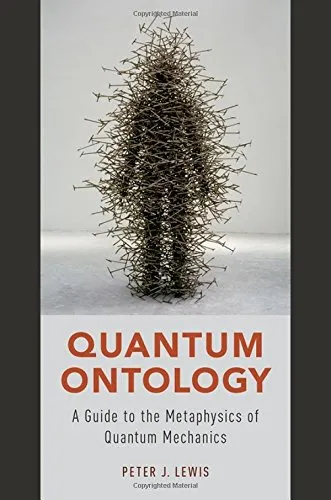Quantum Ontology: A Guide to the Metaphysics of Quantum Mechanics
4.5
Reviews from our users

You Can Ask your questions from this book's AI after Login
Each download or ask from book AI costs 2 points. To earn more free points, please visit the Points Guide Page and complete some valuable actions.Introduction to "Quantum Ontology: A Guide to the Metaphysics of Quantum Mechanics"
"Quantum Ontology: A Guide to the Metaphysics of Quantum Mechanics" by Peter J. Lewis is a compelling and insightful work that delves deeply into the philosophical and metaphysical questions raised by quantum mechanics. By providing a clear and accessible guide to some of the thorniest problems in the field, the book serves as an essential resource for both physicists seeking philosophical grounding and philosophers looking to grapple with modern science. This book addresses the intersection of physics and metaphysics, engaging with quantum theory beyond the equations to consider what these theories reveal about the nature of reality itself.
The goal of the book is to provide a comprehensive framework for understanding quantum mechanics through an ontological lens. Questions like "What is the world made of?" or "How can we reconcile the apparent contradictions of quantum phenomena with our intuitive understanding of reality?" lie at the heart of this exploration. The book examines these queries without requiring the reader to have expertise in advanced physics, making it an ideal entry point for a broad audience interested in unraveling the mysteries of the quantum world.
Detailed Summary of the Book
At its core, "Quantum Ontology" addresses three key questions: What does quantum mechanics tell us about the world? What is the relationship between physical theories and metaphysical commitments? And, most importantly, how can we construct a coherent view of the world that respects both scientific integrity and philosophical rigor?
The book is organized around central topics in the metaphysics of quantum mechanics, such as wave-particle duality, non-locality, and the measurement problem. It reviews various interpretations of quantum mechanics, including the Copenhagen interpretation, the many-worlds interpretation, Bohmian mechanics, and spontaneous collapse theories. Each interpretation is evaluated in terms of its ontological commitments and the clarity it brings to the philosophical puzzles at hand.
Importantly, the book avoids mathematical complexities where possible, focusing instead on the conceptual underpinnings of quantum mechanics and their philosophical implications. From Schrödinger's cat to Bell's theorem, the book carefully dissects famous quantum puzzles, showing how they challenge our understanding of objects and causality. Lewis provides an impartial assessment of each interpretation’s strengths and weaknesses, equipping readers with the tools to form their own conclusions about the nature of quantum reality.
Key Takeaways
- Quantum mechanics forces us to rethink fundamental metaphysical concepts such as reality, causality, and determinism.
- The different interpretations of quantum mechanics reflect not just scientific theories but also deep philosophical commitments about the nature of the universe.
- There is no "one-size-fits-all" interpretation of quantum mechanics; each theory has its own strengths and unresolved challenges.
- Philosophy of science plays an essential role in understanding what quantum mechanics tells us about the nature of the world.
- The book elucidates how the metaphysics of quantum mechanics impacts our broader understanding of ontology and reality.
Famous Quotes from the Book
"When grappling with quantum mechanics, the choice is not whether to confuse reality but how best to do so."
"Quantum mechanics is not a theory that describes how the world is; instead, it is a theory that describes what the world could possibly be."
"The road to understanding quantum mechanics is as much philosophical as it is physical, requiring us to confront questions of existence, reality, and causation."
Why This Book Matters
This book is critical for understanding quantum mechanics not just as a scientific theory but as a guide to rethinking fundamental aspects of reality. By focusing on the metaphysical implications of quantum theories, Peter J. Lewis bridges the gap between physics and philosophy, making the book an invaluable resource for interdisciplinary scholars. Readers will come away with a clearer grasp of the different interpretations of quantum mechanics and what each interpretation demands in terms of our philosophical understanding of existence.
In an era where science often grapples with explaining the nature of the universe, "Quantum Ontology" offers a refreshing perspective, emphasizing the role of metaphysics in complementing empirical data. Whether you are a scientist curious about the philosophical implications of your discipline or a philosopher trying to engage with contemporary science, this book offers insights that are intellectually rigorous yet approachable. The questions it raises are not merely academic but extend to how we conceptualize reality itself.
"Quantum Ontology: A Guide to the Metaphysics of Quantum Mechanics" challenges you to think differently about the universe – and perhaps even about your place within it."
Free Direct Download
Get Free Access to Download this and other Thousands of Books (Join Now)
For read this book you need PDF Reader Software like Foxit Reader


